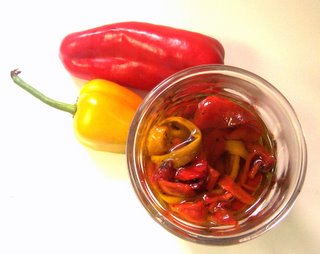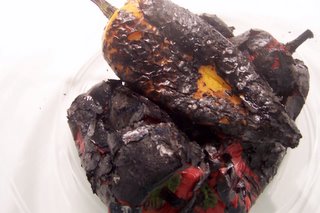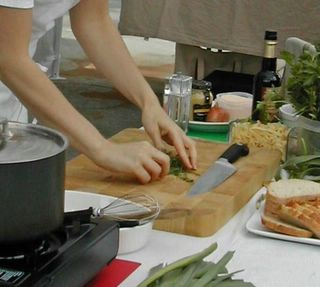Saturday, October 29, 2005
Kitchen Project: Roasting Peppers
.
 In the interest of sharing, I thought I would periodically throw out some basic info and cooking how-to's.
In the interest of sharing, I thought I would periodically throw out some basic info and cooking how-to's.
For my first installment, let's chitter-chat on the super-easy, beautiful, pantry essential, roasted peppers.
Peppers in one form or another are plentiful all year long, but in the fall, the sweet red ones come down in price (especially at farmers markets) and aquiring an overflowing basketful is easy and inexpensive.
Trouble is, once you have scored your bounty, eating them all prior to their demise may verge on gluttonous overdosing. To avoid that I suggest this simple method, it will preserve the peppers, adds a pleasant smokiness, softens the texture and deepens the flavors altogether.
I typically set aside an hour or so to get these done, (usually combining this task with roasting garlic or some other cooking) just so I can get through a large batch. As an alternative method, you could line a sheet pan with foil, and broil a large batch all at once, turning periodically. Either which way, this is a totally worthwhile endeavor. I use the peppers in salads, on pizza, in sandwiches, pureed in soups, as garnish for any number of things, oh heck, the list just goes on and on. And the oil they marinate in becomes faintly tinged with color and flavor too, don't go throwing it out! Try this, and enjoy!
Method:
 Scrub your peppers. (Red, green, chile, they all work)
Scrub your peppers. (Red, green, chile, they all work)
Place directly on your gas burner with the flame on high.
Cook, turning as they blacken.
Remove from fire when totally charred on all sides and put in a large bowl.
Cover the bowl with a towel or plastic wrap and let the peppers steam for about 10 minutes. Take this time to clean the stove top.
When they are mostly cooled, pull off the tops, and rub off the char. Monika Powe Nelson, a tiny Texan I used to know would slap your hand if you dared to rinse the pepper to get the char off because she says that rinses away the flavor. Me, I do it anyway. Go with what works for you.
Make sure to remove all the seeds. Cut into strips and put into a glass jar. Cover with olive oil. You can add some herbs if you like, but NO garlic. That is the recipe for botulism, and nobody wants that. Seal and store in the fridge (yes, the oil will get solid. That's cool, just take it out 5 minutes before you use it. It will go back to liquid.)
And that's it. Easy peasy, simple as pie and all that.
__________________________________________
Are you in Southern California? Tickets are still available for Make Trade Fair Live: A Concert To Support Oxfam America. Let's all do our part to support this worthy cause.
Japan will ease a ban on US beef imports after a Japanese panel declared on Monday that beef from young American cattle is safe if risk materials that could transmit mad cow disease are removed, government officials said. The panel at Japan's Food Safety Commission ended five months of discussion on the safety of US beef with a conclusion that beef and beef offal from American cattle aged 20 months or younger are at very low risk from mad cow disease if specified materials, such as bovine heads and spinal cords, are removed. It was not immediately clear when imports of US beef would resume, but media reports on Monday suggested it could be in December. ABS-CBN News.com
Peter Piper picked a peck of pickling pepper; a peck of pickling pepper Peter Piper picked.
If Peter Piper picked a peck of pickling pepper, where's the peck of pickling pepper Peter Piper picked?
 In the interest of sharing, I thought I would periodically throw out some basic info and cooking how-to's.
In the interest of sharing, I thought I would periodically throw out some basic info and cooking how-to's.For my first installment, let's chitter-chat on the super-easy, beautiful, pantry essential, roasted peppers.
Peppers in one form or another are plentiful all year long, but in the fall, the sweet red ones come down in price (especially at farmers markets) and aquiring an overflowing basketful is easy and inexpensive.
Trouble is, once you have scored your bounty, eating them all prior to their demise may verge on gluttonous overdosing. To avoid that I suggest this simple method, it will preserve the peppers, adds a pleasant smokiness, softens the texture and deepens the flavors altogether.
I typically set aside an hour or so to get these done, (usually combining this task with roasting garlic or some other cooking) just so I can get through a large batch. As an alternative method, you could line a sheet pan with foil, and broil a large batch all at once, turning periodically. Either which way, this is a totally worthwhile endeavor. I use the peppers in salads, on pizza, in sandwiches, pureed in soups, as garnish for any number of things, oh heck, the list just goes on and on. And the oil they marinate in becomes faintly tinged with color and flavor too, don't go throwing it out! Try this, and enjoy!
Method:
 Scrub your peppers. (Red, green, chile, they all work)
Scrub your peppers. (Red, green, chile, they all work)Place directly on your gas burner with the flame on high.
Cook, turning as they blacken.
Remove from fire when totally charred on all sides and put in a large bowl.
Cover the bowl with a towel or plastic wrap and let the peppers steam for about 10 minutes. Take this time to clean the stove top.
When they are mostly cooled, pull off the tops, and rub off the char. Monika Powe Nelson, a tiny Texan I used to know would slap your hand if you dared to rinse the pepper to get the char off because she says that rinses away the flavor. Me, I do it anyway. Go with what works for you.
Make sure to remove all the seeds. Cut into strips and put into a glass jar. Cover with olive oil. You can add some herbs if you like, but NO garlic. That is the recipe for botulism, and nobody wants that. Seal and store in the fridge (yes, the oil will get solid. That's cool, just take it out 5 minutes before you use it. It will go back to liquid.)
And that's it. Easy peasy, simple as pie and all that.
__________________________________________
Are you in Southern California? Tickets are still available for Make Trade Fair Live: A Concert To Support Oxfam America. Let's all do our part to support this worthy cause.
Japan will ease a ban on US beef imports after a Japanese panel declared on Monday that beef from young American cattle is safe if risk materials that could transmit mad cow disease are removed, government officials said. The panel at Japan's Food Safety Commission ended five months of discussion on the safety of US beef with a conclusion that beef and beef offal from American cattle aged 20 months or younger are at very low risk from mad cow disease if specified materials, such as bovine heads and spinal cords, are removed. It was not immediately clear when imports of US beef would resume, but media reports on Monday suggested it could be in December. ABS-CBN News.com
Peter Piper picked a peck of pickling pepper; a peck of pickling pepper Peter Piper picked.
If Peter Piper picked a peck of pickling pepper, where's the peck of pickling pepper Peter Piper picked?
Labels: Kitchen Project
Comments:
<< Home
Post a Comment
so, about this garlic-in-oil thing: is roasted garlic in oil equally botulism-prone? Or does the long cooking kill the nasties before the garlic (and oil) goes into the fridge? (You know, because I have a bunch of roasted garlic in the fridge that's been in there way longer than a week, and I totally don't want to throw it out.)
I went to this site:
http://www.intelihealth.com/IH/ihtIH/WSIHW000/9339/10430.html
And it seems to me that cooking does kill the bacteria.
http://www.intelihealth.com/IH/ihtIH/WSIHW000/9339/10430.html
And it seems to me that cooking does kill the bacteria.
Thanks! The site is awesome - I've been cherry-picking recipes all day and I can't wait for the semester to end so that I'll have time to try them all (gravlax here I come!)
Post a Comment
<< Home
<< Home


